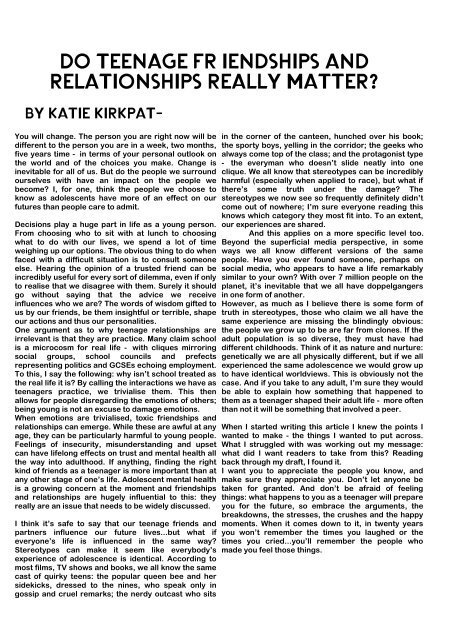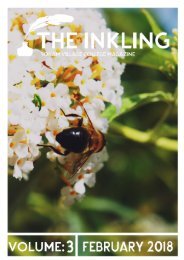The Inkling Volume 2
You also want an ePaper? Increase the reach of your titles
YUMPU automatically turns print PDFs into web optimized ePapers that Google loves.
Do Teenage Fr iendships and<br />
Relationships Really Matter?<br />
By Katie Kirkpat-<br />
You will change. <strong>The</strong> person you are right now will be<br />
different to the person you are in a week, two months,<br />
five years time - in terms of your personal outlook on<br />
the world and of the choices you make. Change is<br />
inevitable for all of us. But do the people we surround<br />
ourselves with have an impact on the people we<br />
become? I, for one, think the people we choose to<br />
know as adolescents have more of an effect on our<br />
futures than people care to admit.<br />
Decisions play a huge part in life as a young person.<br />
From choosing who to sit with at lunch to choosing<br />
what to do with our lives, we spend a lot of time<br />
weighing up our options. <strong>The</strong> obvious thing to do when<br />
faced with a difficult situation is to consult someone<br />
else. Hearing the opinion of a trusted friend can be<br />
incredibly useful for every sort of dilemma, even if only<br />
to realise that we disagree with them. Surely it should<br />
go without saying that the advice we receive<br />
influences who we are? <strong>The</strong> words of wisdom gifted to<br />
us by our friends, be them insightful or terrible, shape<br />
our actions and thus our personalities.<br />
One argument as to why teenage relationships are<br />
irrelevant is that they are practice. Many claim school<br />
is a microcosm for real life - with cliques mirroring<br />
social groups, school councils and prefects<br />
representing politics and GCSEs echoing employment.<br />
To this, I say the following: why isn’t school treated as<br />
the real life it is? By calling the interactions we have as<br />
teenagers practice, we trivialise them. This then<br />
allows for people disregarding the emotions of others;<br />
being young is not an excuse to damage emotions.<br />
When emotions are trivialised, toxic friendships and<br />
relationships can emerge. While these are awful at any<br />
age, they can be particularly harmful to young people.<br />
Feelings of insecurity, misunderstanding and upset<br />
can have lifelong effects on trust and mental health all<br />
the way into adulthood. If anything, finding the right<br />
kind of friends as a teenager is more important than at<br />
any other stage of one’s life. Adolescent mental health<br />
is a growing concern at the moment and friendships<br />
and relationships are hugely influential to this: they<br />
really are an issue that needs to be widely discussed.<br />
I think it’s safe to say that our teenage friends and<br />
partners influence our future lives...but what if<br />
everyone’s life is influenced in the same way?<br />
Stereotypes can make it seem like everybody’s<br />
experience of adolescence is identical. According to<br />
most films, TV shows and books, we all know the same<br />
cast of quirky teens: the popular queen bee and her<br />
sidekicks, dressed to the nines, who speak only in<br />
gossip and cruel remarks; the nerdy outcast who sits<br />
in the corner of the canteen, hunched over his book;<br />
the sporty boys, yelling in the corridor; the geeks who<br />
always come top of the class; and the protagonist type<br />
- the everyman who doesn’t slide neatly into one<br />
clique. We all know that stereotypes can be incredibly<br />
harmful (especially when applied to race), but what if<br />
there’s some truth under the damage? <strong>The</strong><br />
stereotypes we now see so frequently definitely didn’t<br />
come out of nowhere; I’m sure everyone reading this<br />
knows which category they most fit into. To an extent,<br />
our experiences are shared.<br />
And this applies on a more specific level too.<br />
Beyond the superficial media perspective, in some<br />
ways we all know different versions of the same<br />
people. Have you ever found someone, perhaps on<br />
social media, who appears to have a life remarkably<br />
similar to your own? With over 7 million people on the<br />
planet, it’s inevitable that we all have doppelgangers<br />
in one form of another.<br />
However, as much as I believe there is some form of<br />
truth in stereotypes, those who claim we all have the<br />
same experience are missing the blindingly obvious:<br />
the people we grow up to be are far from clones. If the<br />
adult population is so diverse, they must have had<br />
different childhoods. Think of it as nature and nurture:<br />
genetically we are all physically different, but if we all<br />
experienced the same adolescence we would grow up<br />
to have identical worldviews. This is obviously not the<br />
case. And if you take to any adult, I’m sure they would<br />
be able to explain how something that happened to<br />
them as a teenager shaped their adult life - more often<br />
than not it will be something that involved a peer.<br />
When I started writing this article I knew the points I<br />
wanted to make - the things I wanted to put across.<br />
What I struggled with was working out my message:<br />
what did I want readers to take from this? Reading<br />
back through my draft, I found it.<br />
I want you to appreciate the people you know, and<br />
make sure they appreciate you. Don’t let anyone be<br />
taken for granted. And don’t be afraid of feeling<br />
things: what happens to you as a teenager will prepare<br />
you for the future, so embrace the arguments, the<br />
breakdowns, the stresses, the crushes and the happy<br />
moments. When it comes down to it, in twenty years<br />
you won’t remember the times you laughed or the<br />
times you cried...you’ll remember the people who<br />
made you feel those things.




